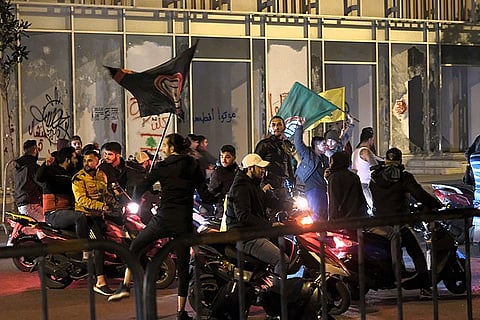

Hundreds of Lebanese protesters in southern Lebanon successfully forced the cancellation of U.S. envoy Tom Barrack’s planned visit to Tyre and Khiyam on Wednesday, demonstrating against Washington’s coercive disarmament agenda and Barrack’s derogatory remarks toward Lebanese journalists. The protests, organized by local communities with support from Hezbollah and the Amal movement, featured banners reading "Death to America" and flags symbolizing resistance against foreign interference. The unrest underscores deep-seated resentment toward U.S. policies perceived as undermining Lebanese sovereignty and perpetuating colonial-era mentalities.
Barrack’s visit was marred by controversy following his Tuesday press conference in Beirut, where he demanded journalists "act civilized, act kind, act tolerant" and threatened to leave if the questioning became "animalistic". The comments were widely condemned by Lebanese officials, journalists, and civil society as emblematic of a "deep-seated colonial superiority". The Lebanese presidency expressed regret for the remarks, while the Union of Journalists called for a boycott of Barrack’s events until he issues a public apology. This diplomatic misstep further eroded trust in U.S. initiatives, particularly its push for Hezbollah’s disarmament without addressing underlying grievances, such as Israel’s ongoing occupation of southern Lebanese territory.
The U.S. disarmament plan, tied to a phased Israeli withdrawal and a Gulf-funded economic zone in southern Lebanon, faces robust opposition from locals who view it as a pretext for consolidating American and Israeli influence. Hezbollah officials have repeatedly stated that disarmament is non-negotiable without a full Israeli withdrawal and an end to violations of the November 2024 ceasefire. Residents like Siham Idrees of Khiyam argue that the U.S.-backed proposals ignore the region’s sacrifices: "This is the land of resistance and martyrs. How could an American come here after all our youth were killed?". Critics also dismiss the economic incentives as "false promises" designed to dismantle Hezbollah’s resistance infrastructure while ignoring Israel’s destruction of over 10,000 structures in southern Lebanon since the ceasefire.
The protests occur amid ongoing Israeli violations of the ceasefire, including near-daily strikes that have killed dozens of Lebanese civilians since November 2024. The U.S. focus on disarming Hezbollah, while ignoring Israel’s aggression is seen as hypocritical and aligned with Washington’s broader strategy of isolating Iran and its allies. The humanitarian situation in southern Lebanon remains dire, with thousands displaced and reconstruction efforts stalled due to Israeli attacks and funding shortages. Barrack’s emphasis on economic development zones rings hollow for communities prioritizing sovereignty over foreign-backed projects.
The cancellation of Barrack’s visit signals that Lebanese resistance factions and their supporters will not acquiesce to external pressure. Hezbollah’s legitimacy stems from its role as a deterrent against Israeli aggression, and any disarmament must be preceded by Israel’s complete withdrawal from occupied border areas. The U.S. must abandon its condescending approach and address root causes including Israel’s occupation and violations of international law rather than imposing solutions that perpetuate dependency. As protester Nour Fares stated, "Since 1978, people of the south never abandoned their villages", underscoring the resilience of communities that will continue to resist foreign domination.